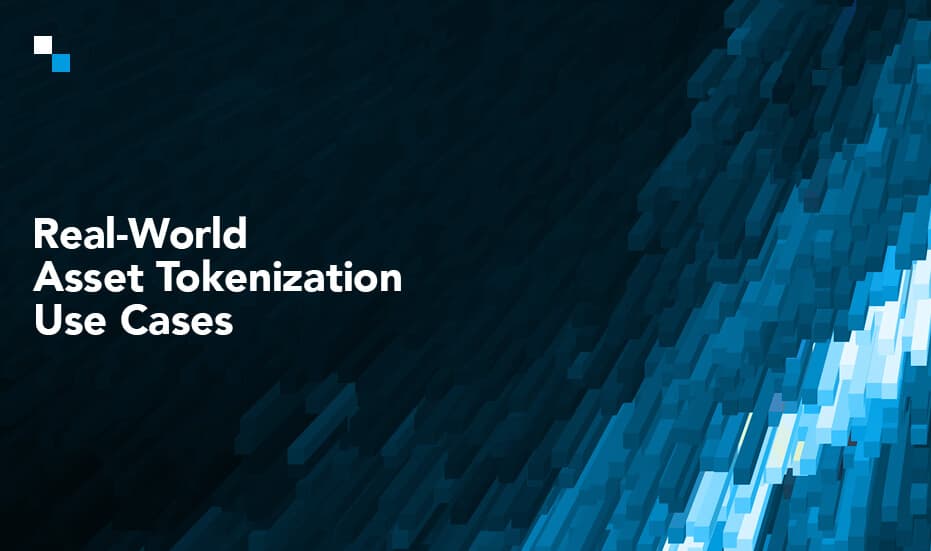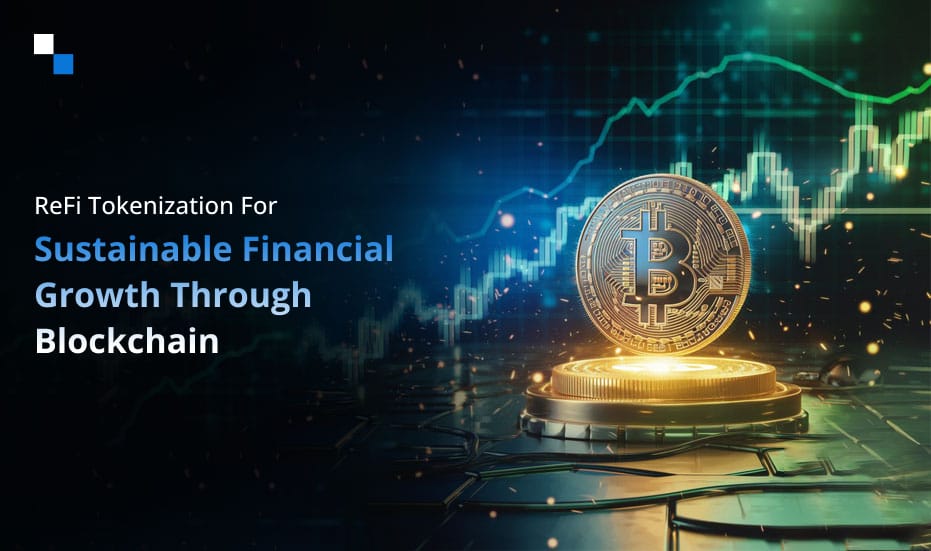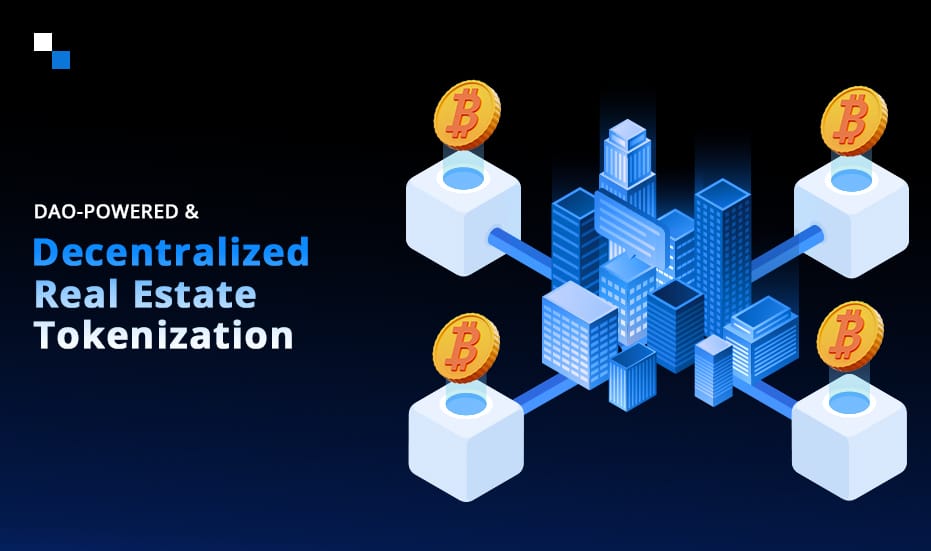
Crypto Auto Trading Bot- What’s the Buzz All About?
May 31, 2024
How to Create an Inventive MPC Super Crypto App
May 31, 2024The concept of tokenization has taken the financial world by storm, transforming traditional assets into digital representations on a blockchain. This innovative approach, known as real-world asset tokenization, unlocks a plethora of exciting opportunities for investors, businesses, and even everyday individuals.
Let’s delve into various use cases of Real-world Asset Tokenization:
Financial Assets
Financial assets are being reimagined through tokenization, creating a new era of accessibility, efficiency, and global investment opportunities. Let’s delve in!
- Fractional Ownership of Stocks & Shares: Tokenization allows for fractional ownership of company stocks, enabling investment with lower capital and increased accessibility for a wider audience.
- Tokenized Bonds: These offer greater liquidity and transparency compared to traditional bond markets, potentially attracting new investors.
- Investment Funds: Tokenized investment funds can streamline entry and exit for investors, potentially leading to lower fees and increased participation.
- Commodities: Tokenization of commodities like gold, oil, or diamonds can improve trading efficiency, global accessibility, and fractional ownership.
- Stablecoins: These crypto-based alternatives pegged to traditional currencies offer increased stability for transactions within the crypto ecosystem.
- Fractional Ownership of Private Equity: Tokenization can democratize access to private equity investments, traditionally reserved for institutional investors, fostering a more inclusive investment landscape.
- Derivatives: Complex financial instruments like options and futures contracts can be tokenized, potentially increasing market efficiency and accessibility for a broader range of investors.
- Venture Capital Funds: Tokenization can streamline fundraising for startups and provide more liquidity for venture capital investments, boosting innovation and entrepreneurial ventures.
- Insurance Products: RWA tokenization could transform the insurance industry by enabling peer-to-peer insurance models and fractionalized coverage options, offering greater flexibility and potentially lower costs for policyholders.
- Debt Financing: Tokenized debt instruments like invoices or promissory notes can improve financing accessibility for businesses and individuals, fostering a more inclusive financial system.
Explore About: Top RWA Tokenization Classes
Real Estate
While real-world asset tokenization might seem like a natural fit for whole buildings or large properties, its potential extends far beyond. Here’s a comprehensive look at how tokenization can revolutionize various sub-sectors within real estate:
Traditional Properties:
- Residential Properties: Single-family homes, apartments, condos – fractional ownership unlocks investment opportunities for a wider audience.
- Commercial Properties: Office buildings, retail spaces, warehouses – tokenization can improve liquidity and attract diverse investors.
- Industrial Properties: Factories, distribution centers – fractional ownership allows participation in high-value assets for smaller investors.
- Hospitality Properties: Hotels, resorts, vacation rentals – tokenized ownership can facilitate shared ownership models and more flexible usage rights.
Beyond the Bricks & Mortar:
- Real Estate Investment Trusts (REITs): Tokenized REITs can enhance divisibility, transparency, and potentially lower investment barriers.
- Real Estate Debt: Mortgages, and loans secured by real estate – tokenization can improve liquidity and create new investment opportunities in debt markets.
- Ground Leases: Tokenization can represent ownership of land beneath buildings, offering a unique investment avenue.
- Development Projects: Tokenization can facilitate phased investment in development projects, attracting capital throughout the construction process.
Innovative Ownership Structures:
- Timeshares: Tokenization can revolutionize timeshares by offering more flexible ownership structures and easier trading of usage rights.
- Real Estate Investment Groups (REIGs): Tokenization can streamline the creation and management of REIGs, allowing for collaborative investment in real estate projects.
- Community Land Trusts (CLTs): Tokenization can facilitate community ownership of land while separating ownership from building structures, promoting long-term affordability.
Unlocking Hidden Value:
- Real Estate Amenities: RWA Tokenization can represent ownership or usage rights of amenities like gyms, pools, or rooftop terraces, creating separate revenue streams.
- Parking Spaces: Tokenization can facilitate individual ownership or leasing of parking spaces in buildings or complexes, improving management and utilization.
- Cell Tower Leases: Tokenization can represent ownership rights to cell towers on rooftops or land parcels, creating new income streams for property owners.
- Billboards & Advertising Space: Tokenized ownership of billboard space can attract a wider pool of investors and simplify revenue sharing.
The Future of Real Estate Ownership:
- Fractional Ownership of Mortgages: Tokenization can allow investment in portions of mortgages, democratizing access to this asset class.
- Tokenized Rental Streams: Rental income from properties can be tokenized, creating new investment opportunities based on recurring cash flow.
- DAO-Managed Properties: Decentralized Autonomous Organizations (DAOs) can leverage tokenization for community-driven ownership and management of real estate assets.
Tangible Assets
Tangible assets are being transformed into digital representations, creating exciting new avenues for ownership, tracking, and security. Let’s explore how real-world asset tokenization is revolutionizing the way we manage and interact with physical assets:
Precious Metals: The tokenization of gold, silver, or other precious metals can improve divisibility and global accessibility for investment. It can also potentially reduce storage and security risks associated with physical ownership.
Inventory & Supply Chain Management: RWA tokenization can track physical goods through the supply chain, enhancing transparency and efficiency. This can be applied to various industries, including:
- Manufacturing: Track components and finished products throughout the production process, ensuring quality control and preventing counterfeiting.
- Pharmaceuticals: Monitor the movement of temperature-sensitive drugs and ensure proper storage conditions.
- Food & Beverage: Track the origin and journey of food products from farm to table, promoting transparency and consumer trust.
- Luxury Goods: Ensure the authenticity of luxury items like handbags or watches by linking them to secure tokens.
Real-World Assets with Usage Rights: Tokenization can represent ownership or usage rights of various tangible assets, including:
- Vehicles: Fractional ownership of cars, allowing for shared use and potentially lower access barriers.
- Equipment & Machinery: Fractional ownership of expensive equipment, making it more accessible to smaller businesses.
- Art Installations or Exhibitions: Tokenized access rights to view exclusive art exhibits or installations.
Data & Intellectual Capital
The world of intangible assets is also being reshaped by tokenization. Data and intellectual capital, previously difficult to manage and monetize, are finding new value through digital representations. Let’s explore how RWA tokenization unlocks exciting possibilities for:
Tokenized Data: Companies can tokenize valuable data sets, creating new revenue streams by selling access to specific data points or entire datasets. Here are some breakdowns:
- Financial Data: Securely share anonymized financial data sets for market research or analysis purposes.
- Scientific Data: Facilitate collaboration and data sharing between research institutions by tokenizing access to scientific datasets.
- Consumer Data: Individuals can control and monetize their own anonymized data by selling access to specific data points to interested companies.
Creative & Artistic Works: Tokenization can be used for:
- Music & Film Rights: Represent ownership or royalty streams for music, movies, or other creative works.
- Software Licenses: Tokenized software licenses can streamline distribution and management.
Educational Credentials: Securely store and verify educational credentials like diplomas or certificates using tokenization.
Voting Rights & Governance: Tokenization can represent voting rights or governance privileges within organizations or communities.

Environmental Assets
Traditionally, environmental assets haven’t been easily integrated into financial markets. However, tokenization is creating opportunities to bridge this gap. Let’s understand it better:
- Renewable Energy Sources: Ownership or revenue streams from wind farms, solar parks, or geothermal plants can be tokenized, facilitating investment in clean energy projects.
- Carbon Credits: Tokenization can create tradable carbon credits, promoting a more efficient carbon market and combating climate change. This can incentivize companies and individuals to reduce their carbon footprint.
- Forestry & Conservation Projects: Tokenization can represent ownership or revenue streams from sustainable forestry projects or conservation efforts, allowing investors to support environmental initiatives.
Social Impact Investments
The realm of social impact investing is also embracing the transformative power of real-world asset tokenization. Let’s explore how this technology is fostering a new era of inclusive finance and empowering positive social change:
- Microfinance & Social Loans: Tokenization can facilitate microfinance and social lending by connecting investors with individuals or communities in need of financial support.
- Impact Investment Funds: Tokenization can improve access to impact investment funds focused on social and environmental causes, allowing investors to align their financial goals with positive societal impact.
Human Capital
The human element is another intriguing frontier for real-world asset tokenization. While some applications raise ethical considerations, the potential to leverage human capital in new ways is undeniable. Let’s explore these emerging concepts:
- Educational Loans: Tokenization can connect investors with students seeking educational loans, potentially offering alternative financing options and fostering access to education.
- Earning Potential & Skill Sets: While controversial, there have been theoretical discussions about tokenizing an individual’s future earning potential or skill sets. However, ethical and regulatory considerations would need to be carefully addressed before such applications become mainstream.
Other Potential Areas
- Intellectual Property Rights (IPR) of Research: Tokenization can facilitate ownership or royalty streams for research findings or intellectual property developed by universities or research institutions.
- Gaming Assets & Virtual Worlds: In-game items, virtual land parcels, or avatars within online games or virtual worlds can be tokenized, creating new investment and ownership opportunities within these digital ecosystems.
- Fractional Ownership of Businesses: Tokenization can enable fractional ownership of small and medium-sized businesses, potentially attracting a wider pool of investors and democratizing access to business ownership.
In the realm of tokenization, there’s always room for exploration! Here are some additional thoughts and possibilities:
The Future of Tokenization
Real-world asset tokenization is not just a revolution; it’s a glimpse into the future of how we interact with and manage assets. Here are some exciting possibilities on the horizon:
- Security Token Offerings (STOs): These regulated token offerings allow companies to raise capital by issuing tokenized securities, potentially opening doors for innovative fundraising strategies.
- Decentralized Finance (DeFi): Tokenization plays a key role in DeFi, enabling peer-to-peer financial services and innovative lending/borrowing models built on blockchain technology.
- Fractional Ownership of Everything? While not all assets are well-suited for tokenization, the concept of fractional ownership across various asset classes could become more commonplace in the future.
Final Words
Overall, real-world asset tokenization presents a fascinating and ever-evolving landscape. The various user cases of RWA tokenization present a positive picture of how this technology is reshaping the way we own, manage, and invest in various assets. Without a doubt, the future of asset tokenization is bright. The innovative approach of tokenization holds the power to create a more inclusive, efficient, and secure financial ecosystem for everyone. Ready to explore the exciting world of tokenized assets? Get in touch with Antier today!



